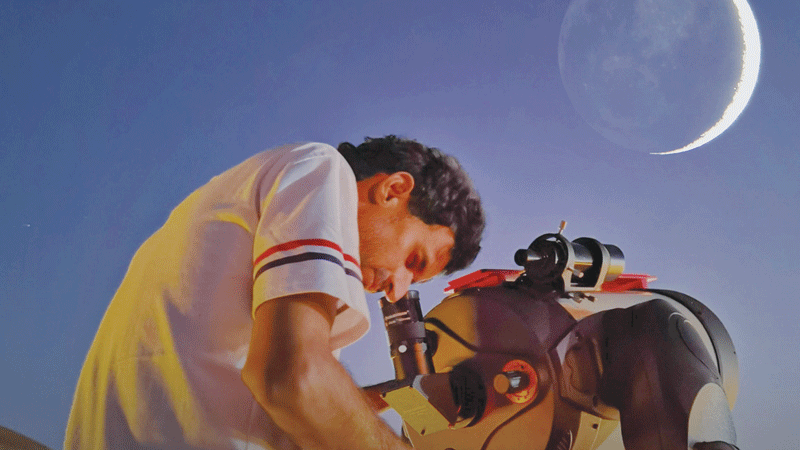

It took less than a minute for him to find what he was looking for. With one eye on the narrow viewing scope of his Celestron EdgeHD 11” optical tube, he addressed the four people who joined the first batch of his Stargazing camp.
"To the naked eye, we can see but a few of the brightest stars in this part of the sky. Using this HD telescope, you will learn and see that there are more stars in this small patch of darkness beyond what the naked eye can see,” he said.
Mohammed al Kamli has a degree in Geology. Born and raised in Al Sharqiyah, his home is a few kilometres away from the Wahaiba Sands. Many of his fun childhood memories included different adventures in the desert and growing up in a time that Oman was just developing, he used to look up at the night sky and wondered what the universe was like.
He ended up taking a minor in Astronomy in college. At this time, he learned from some of the best minds and professors of Sultan Qaboos University.
After graduation, he worked for several years in the desert for one of Oman’s biggest oil companies. In the darkness and silence of Oman’s oil field, the night sky was his constant escape and entertainment. There were weeks when he has no access to the internet. During those long nights, his passion for astronomy got even deeper.
It didn’t take long when he left his job at the oil field and moved towards hospitality and tourist guiding. Fuelled by his desire to showcase Oman’s night sky, he worked for Alila Jabal Akhdhar as its in-house stargazing expert. It is here where he realized that there was so much more to learn about the night sky — from the legend and history of how they got their shapes to how they have constantly influenced the lives of humans even in the ancient times.
He asked the participants of the stargazing camp to look at the scope one after the other. Each one of them gave a deep gasp surprised that they knew so little.
The session can take an hour or two depending on the interest of the participants. In that period, Mohammed moves from science to history, to legends with little tidbits of how Bedus or Omanis used the stars as reference.
He can talk for hours about Orion’s belt, of how one can spot Polaris — the north star, or how one can tell which is south from the east basing only on the stars.

“This is how people in the past travelled. Without a compass or GPS, it’s hard for us to imagine how one can travel with such restrictions. Even the Bedus rely on this ancient knowledge and that is how they know where to go when they explore the vast desert,” he said.
While still employed by Alila Jabal Akdhar, Mohammed has decided to buy his own gear. He opted for a Celestron that allowed him to spy into the sky 280 or more times than a regular telescope.
“You can see the creases on the moon. You can make out some of its landscape. You can spot some of the galaxies, one that we usually just see on TV,” he said.
Mohammed is proud that Oman has some of the world’s best stargazing spots.
“When you’re doing stargazing, you need to have as little light pollution as possible. The desert of Oman’s and the different mountains are well-suited for that,” he said.
Oman has a decree that protects some areas from light pollution and for this, Mohammed was very thankful because it allowed people to see a different spectacle.
Aside from Mohammed, there are barely other fun stargazing camps in Oman. Telescopes like the one he has is really expensive. Mohammed decided that in his off-days, he organize camps or collaborate with hotels in the desert who wanted to give their guests a different experience.
His latest venture was a partnership with Sama Al Wasil Desert Camp that has made the right move of providing a different attraction for their guests. He currently has an agreement with them to do it every weekend while on weekdays, he is in Alila Jabal Akhdhar.
“I’d like to do more of this, to let people in Oman have a different experience. For some of the Omanis, they can’t seem to appreciate what a stargazing camp is all about. Many of them find it boring to peer through a telescope and stare at a night sky that they can see the stars already. I think in some way, I wanted to open their understanding especially the younger generations. I wanted them to look up a dark night sky and imagine far beyond what they can see,” he said.
“The night sky has stories to tell and whether it’s the moon or the star formations, they had been influencing human civilization for a long time. We are blessed to be living in a country where we have access to this. I wanted to share that beauty to as many people as possible,” he said.
To learn of Mohammed’s stargazing schedule, follow him on Instagram at @geoastro_oman or contact him at +968 9289 4665.
BY YERU EBUEN
Oman Observer is now on the WhatsApp channel. Click here



